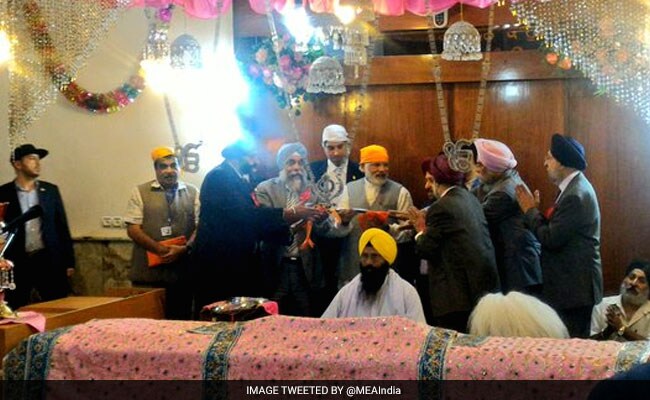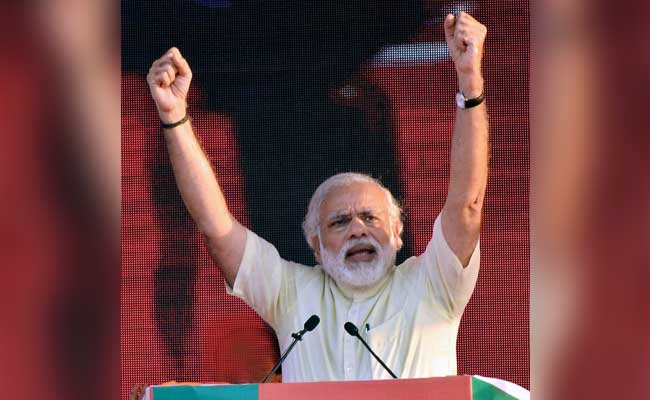Modi began his visit to the Iranian capital on May 22 by going to a Gurudwara - no doubt with an eye to the elections in Punjab in January 2017 - and ended it on May 23 by signing an ambitious trilateral agreement with the Afghan and Iran presidents. The pact committed India to building a deep water port at Chabahar in the north Indian Ocean, enabling Indian trade and traders to bypass Pakistan and access not only Afghanistan and Central Asia, but also the enormous expanse of market-friendly Russia beyond.

Prime Minister Narendra Modi at Tehran's Bhai Ganga Singh Sabha Gurdwara on May 22

PM Narendra Modi addressed a rally in Saharanpur on Thursday to mark two years of his government
Not for one second, though, did Modi or anyone in his testosterone pumped-up entourage in Saharanpur - from Home Minister Rajnath Singh to the BJP's man in-charge of UP, Om Mathur - spare a thought for the man lynched last September in Bisada village near Dadri, on the mere suspicion of eating beef. Dadri is just 55 km away from Delhi.
Mohammed Akhlaq used to live in Bisada village, 7.3 km off the highway from Dadri, when he was killed on the suspicion of keeping beef in his refrigerator. The road due north to Saharanpur is another 184 km, barely a couple of hours away by car.
Imagine if the PM had driven to Bisada, stopped by at Akhlaq's household and inquired after his son, who works in the Indian Air Force and was badly injured that night last year his father was killed. Imagine if the PM had folded his hands in sympathy and reassurance in front of Akhlaq's daughters and widow.
A short visit to Bisada would have done much, much more to burnish Modi's credentials with the Muslim world - indeed, across the entire country - than events like the World Sufi Forum in March in which hundreds of maulvis from several Islamic schools were invited to meet the PM, or his visits to Sunni-dominated Saudi Arabia in April, or even to Shia-majority Iran, recently.
But the truth is that Modi is given to the grandiloquent gesture, not the quiet, reassuring behind-the-scenes press of the hand. He would rather be seen embracing US President Barack Obama, still the world's most powerful man, which is why he is going to meet him next month, for the seventh time since he became PM, or organizing the world's largest Yoga Day or making a last-minute, jaw-dropping visit to attend Pakistan Prime Minister Nawaz Sharif's grand-daughter's wedding outside Lahore.
Modi simply loves the spectacle, the razzmatazz, the extravaganza that adds an extra edge to the daily business of politics. But he isn't given to the large-hearted business of reaching out to his opponents, especially those he has bested - in the Saharanpur rally he derisively referred to those "who will never understand even as the rest of India does," a reference to the Congress party.
Nor has he fully realized that as Prime Minister, or "pradhan sevak" as he called himself at Saharanpur, he is no longer the RSS pracharak he once was, even if that was his identity for most of his adult life.
In these past two years, Modi has never once publicly apologized for the slurs his colleagues have employed against Muslims, like Sadhvi Niranjan Jyoti, nor reined in the Bajrang Dal hordes who recently held a self-defence camp in Ayodhya against skull-cap wearing "terrorists." In fact, the PM, who otherwise seems as if he is constantly in election campaign mode, has maintained a curiously, stony silence in the face of aggravating social tension.
Certainly, the campaign brings Modi alive. Despite sweeping India in 2014, he has relentlessly continued to lead state elections, from Haryana and Maharashtra later that year to Bihar in 2015 to the unprecedented victory in Assam recently. Punjab beckons in early 2017, as does the king of all campaigns, Uttar Pradesh. Certainly, as the mammoth rally in Saharanpur demonstrated, Modi believes that the road to victory in 2019 will lie through that state next year.
You could call him India's first 24x7 prime-time Prime Minister. Atal Behari Vajpayee was his wooden best on air, while Manmohan Singh simply hated the limelight. Both Sonia Gandhi and her son, Rahul, believe there is more to governance than being comfortable with the teleprompter.
Much has been written about the laundry list of schemes that Modi has announced with considerable fanfare these past two years, several of them extremely credit-worthy like the Jan Dhan Yojana and the Beti Padhao scheme. And although the first green-shoots in the economy are becoming visible, with low oil prices aiding the government-sponsored fiscal stimulus (especially in roads, telecom, solar power and fertilisers), fact is that a recovery in the investment cycle - which is fundamental to sustainable growth - will have to wait, at least for another year.
The PM realizes that his government has to move much faster on the jobs front - especially as India adds a million adults to the job market every month. So all the ministries in Delhi have been told to think up schemes that will focus on the creation of jobs.
But Modi also realizes that India lives in its states - and in the villages. One of his most successful achievements has been to cut back about 33 per cent funds at the centre and transfer them to the states.
Other measures to boost the economy include the passage of the bankruptcy law, Finance Minister Arun Jaitley's decision to allow banks to deal with non-performing assets and the PM's approval of RBI governor Raghuram Rajan.
Clearly, Modi likes to think of himself as a master puppeteer, pulling the strings so as to balance his puppets - or, perhaps, keep them off-balance. For example, Modi has used the infamous Arun Jaitley-Subramanian Swamy rivalry as a good way to keep both sides guessing.
By making Subramanian Swamy a Rajya Sabha MP, Modi got him to articulate his intense dislike of the Sonia Gandhi family. So much so that the CBI is now all set to further investigate the AgustaWestland scam. Perhaps Modi is signalling to Jaitley that his famous political skills with opposition leaders like Sonia Gandhi, Nitish Kumar and Mayawati are falling somewhat short.
But neither is the PM likely to let Swamy have his way with Raghuram Rajan, whom Swamy has twice slighted this last fortnight. A sign that Jaitley remains a key Modi aide is his recent comment to NDTV that he disapproves of "personal attacks" against the RBI governor.
And so it goes in Modi's Delhi. As the PM asserts himself on the national firmament, his trusted confidante and party president Amit Shah constantly by his side, the rest of the BJP plays the political version of "snakes and ladders." Perhaps they derive comfort from the fact that the game is as old as the Mahabharata.
(Jyoti Malhotra has been a journalist for several years and retains an especial passion for dialogue and debate across South Asia.)
Disclaimer: The opinions expressed within this article are the personal opinions of the author. The facts and opinions appearing in the article do not reflect the views of NDTV and NDTV does not assume any responsibility or liability for the same.


